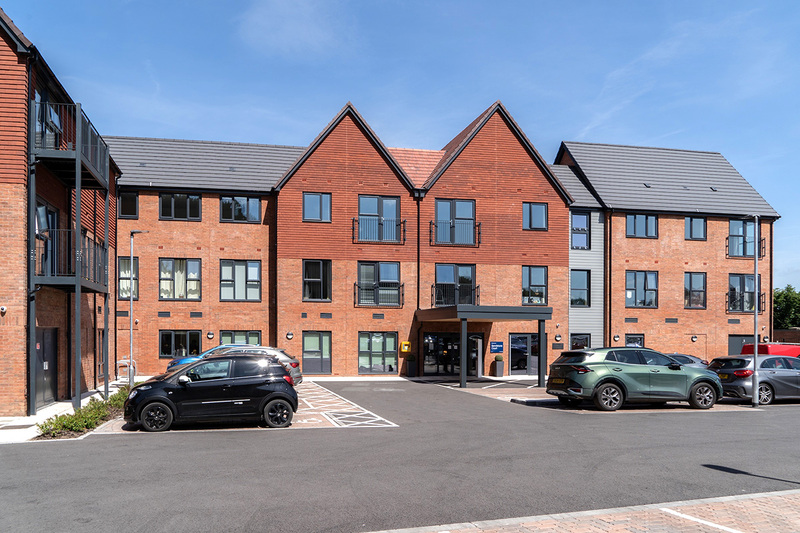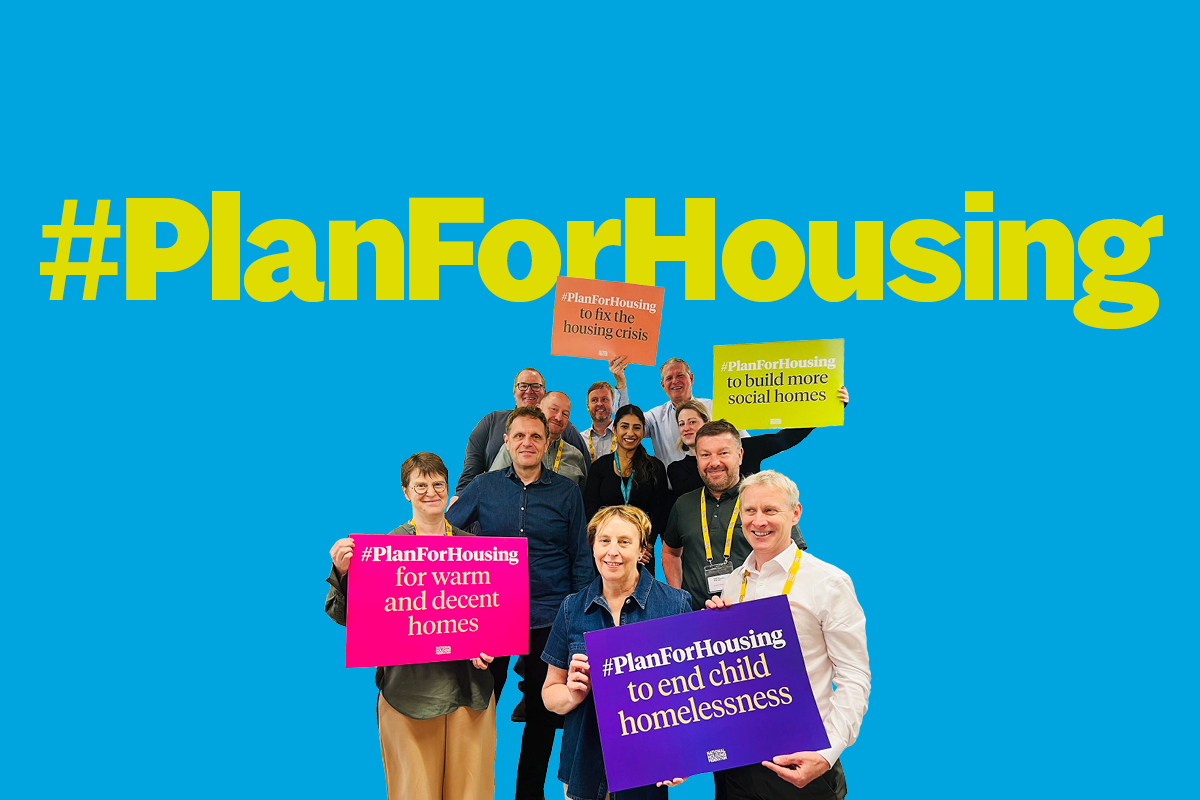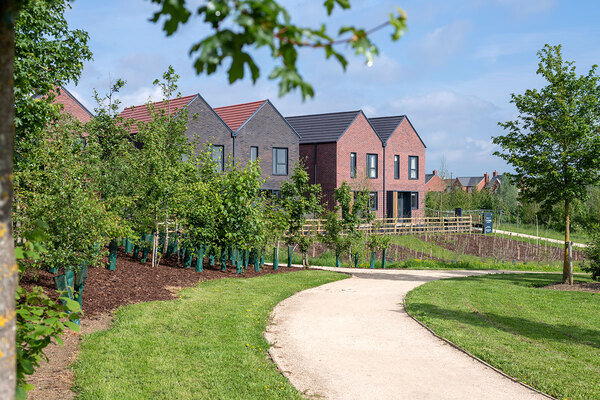You are viewing 1 of your 1 free articles
Housing 21 CEO: ‘If you don’t have people well-housed, the revenues that go into social care and health are going to bankrupt the system’
Bruce Moore, chief executive of Housing 21, says there is an urgent need for the new government to draw up a long-term strategy for housing the UK’s ageing population. As part of Inside Housing and the National Housing Federation’s Plan for Housing series, he tells Martin Hilditch why the cost of inaction could be catastrophic

Bruce Moore thinks the UK is heading for a social and financial catastrophe, created by a failure to plan for the housing needs of its ageing population.
“It looks bleak,” Housing 21’s chief executive says about the future for health, social care and the economy. The potential scale of the problem is so vast, he thinks the government must urgently be persuaded to draw up a long-term housing strategy for its ageing population.
“If you don’t have people well-housed, the revenues that go into social care and health are just going to completely bankrupt the whole system,” he states.
The figures certainly look stark. In 2022 there were around 12.7 million people aged 65 or over in the UK – 19% of the population. According to projections by the Office for National Statistics, by 2072 this could rise to 22.1 million, or around 27% of the population.
When it comes to planning for the future, there might be some light on the horizon. The new government has, after all, promised to publish a long-term housing strategy for England in the spring. While the commitment has been made, there is little detail about what will be in the strategy. To influence this, the National Housing Federation (NHF) has just launched a partnership with Inside Housing to gather opinion pieces from across the sector and beyond, to make sure many voices feed into its formation.
As part of this process, we spoke to Mr Moore. After all, his housing association is one of the leading providers of extra care and retirement living in England, operating in 215 council areas, managing more than 24,000 homes and providing more than 49,000 hours of care every week. This year is Housing 21’s 60th anniversary, which is a cause for celebration, but also an opportunity to think about the future.
Crucial to getting that right is a standalone strategy for our ageing population, Mr Moore believes.
“The scale of the population challenge, of the ageing population, is such a huge thing,” he says. “I think we’ve bandied the statistics around, but the penny hasn’t quite dropped that actually this is going to be fundamental, the scale of that shift. You see countries like Japan, who have been through that shift, and it can cripple the economy if you are not careful.”
This is no small warning. Japan has the oldest population in the world, with more than one in 10 people aged 80 or over and 29.8% of its population aged 65 or over. In January 2023, its prime minister Fumio Kishida said that “Japan is standing on the verge of whether we can continue to function as a society” due to the impact of the ageing population and falling birth rates.
While Japan is an extreme case, the UK faces similar pressures. Without a housing strategy for our ageing population, Mr Moore says that the Labour government’s headline manifesto commitment to “get the NHS back on its feet” is doomed to failure.
“They [the new government] are still in listening mode,” he says. “Obviously they are sorting the economy out and picking up on what the priorities are, but we really want to add our voice into the mix to make sure older people don’t get lost. If they don’t sort out housing for older people, they won’t ever be able to fix social care, or the NHS.”
In February this year, the NHF’s older person’s housing group painted a grim vision of the future if action is not taken.
Suggesting that we need to build 38,000 new homes for rent for older people a year – of which 21,000 should be for social rent – it said that “by not meeting this demand, we risk a generation of retirees being unable to pay their private rents and increasing the housing benefit bill”.
Those figures sprang from a 2019 report by the All-Party Parliamentary Group for Housing and Care for Older People, which pointed out that the number of households in the private rented sector headed by someone aged 65 or over will more than treble by 2049, from around 450,000 to more than 1.5 million.
“The consequence of there being nowhere affordable for these households to go is bound to be homelessness for some and a move into temporary accommodation at the state’s expense for others,” the report said.
“If you haven’t paid off your house or you haven’t got a house at all, which is quite a big chunk of the population, where are you going to live?” Mr Moore asks. “The cost of that [to individuals] is going to be huge. It is going to drain everyone’s resources and make them poor.”
And, without planning, the homes people live in will also add cost into the system, Mr Moore emphasises.
“There’s going to be a huge cost to government in terms of paying that private rental cost, or people will have to be pushed out into lower standards of accommodation. And once they are in that, people are going to have problems. They are going to have falls, they are not going to be able to heat it properly. They will be socially isolated and trapped. And that is where you have social care and health costs.”
Equally, a shortage of supply of specialist housing for older people means that it is increasingly being allocated to older people with more complex needs, creating growing management challenges and pressures on maintaining a sense of community.
In recent years, the government set up an older people’s housing taskforce to look at options for the provision of greater choice, quality and security of housing for older people (it submitted its report to the government just before the election this year), although Mr Moore feels it was too focused on the needs of older homeowners. The last full strategy from the government dates back the best part of a generation to 2008’s report, Delivering Lifetime Homes, Lifetime Neighbourhoods, Mr Moore points out.
“If they don’t sort out housing for older people, they won’t ever be able to fix social care, or the NHS”
“That recognised that actually the scale of the ageing population needed a systemic change, rather than just a little bit more housing,” he says. Today, the scale of the problem is much bigger.
So, what should the next steps be? Mr Moore says that the government could do worse than look at the 15-point plan set out by the Housing and Ageing Alliance (a group that includes Age UK, the NHF and Housing LIN among others) in March this year.
As well as calling on the government to draft a national older people’s housing strategy, it calls for local authorities to develop older people’s housing strategies, mapping existing housing for older people across all types and tenures, and where there are notable gaps. It also says that Homes England investment in all supported housing should expand, with a minimum of 10% of its grant programme to be for older people’s housing.
“We need to present a concerted front,” Mr Moore says of the alliance. And that means every part of the sector.
“Specialist housing, like Housing 21 provides, is just one part of the jigsaw. The trouble we’ve had in the past is that, as a sector, we have argued for our piece of the jigsaw to be the most important. That’s why I like the Housing and Ageing Alliance position. It understands that you need political will. It understands that there’s a role for the private sector and the higher end of the market, a need for social providers and a need for better adaptations of general housing and better design.”

Historically, everyone arguing for their own corner made it too easy for the government to “sit back and say ‘well, actually, until you’ve worked out how it’s going to be, we’ll keep letting you have your own battles’”, he adds.
If there is more of a collective voice thanks to the alliance, Mr Moore also says that any future strategy needs to factor in the state of current provision for older people – informed by a clear-eyed analysis from the sector.
“I also think we need to shine the spotlight on ourselves to say where what we’re currently providing isn’t good enough. We should acknowledge that, rather than trying to eke it out. There is a lot of poor-quality accommodation for older people that we don’t vilify enough to say that this is really not adequate and acceptable. Because there’s so little supply, people are still accepting really bad-quality accommodation. I think it is a scandal, to be honest.”
Housing 21 has been acting on this advice. In recent years it has been investing in its older retirement living properties – they are now all Energy Performance Certificate Band C or better (driven largely by a desire to make sure homes were affordable to heat, rather than the environmental agenda). Kitchen and bathroom specifications have been enhanced and given a 20-year life cycle, with plans to complete the roll-out of wi-fi to all communal areas in the next two years.
“The further we push it back, the bigger the pain we are going to have to deal with”
Nonetheless, there are still major challenges that any government strategy for the sector would need to consider. For example, Housing 21 provides care in roughly half of its 191 extra-care services, delivering more than 49,000 hours of care per week. The turnover is £50m – but for virtually zero profit, Mr Moore says.
“Post-COVID, councils got a boost to support their care services and costs, and that did mean that they could pay just that little bit extra to provide what was needed to run a care service,” he says. “Now we are being offered prices that are, to be honest, just not sustainable to provide a decent, stable quality care service.”
More immediately, proposals to require qualifications for housing managers may also prove problematic if they apply to scheme-based roles, Mr Moore thinks. Housing 21 currently has more employees who are over retirement age than those who are under 25, and many may choose to exit rather than undertake the training, he worries.
“You’ll take them away for a day a week’s training, which is a really big loss of service as well,” he says. “So, I’m paying for a five-day-a-week service, or 35 hours a week of presence, and you’ve just taken seven hours of that away from me. How’s that good value?”
There is, however, an opportunity now for the new government to plan for a brighter future – and that means it must draw up a strategy for housing the ageing population, he argues.
For the government, Mr Moore says there is always a temptation to kick the issue down the line because “there’s pain with acting”. The scale of the problem is so big that this approach must stop, he adds.
“The further we push it back, the bigger the pain we are going to have to deal with,” he says. “I do feel we’ve drifted over 10 to 15 years really, in terms of not having a clear strategy. We really need to get hold of this.”
Recent longform articles by Martin Hilditch
As Inside Housing celebrates its 40th anniversary, we want to identify and build the profile of the outstanding individuals who will shape the housing sector over the next 40 years. Editor Martin Hilditch sets out the ambitions of the publication’s new 40 Under 40 list
Could adjustable housing be the big idea that helps the UK thrive in the 21st century?
Late last year, Dr Philip Graham won the Thinkhouse Early Career Researcher’s Prize for his paper arguing that adjustable housing could be the answer to some of the UK’s housing problems. Martin Hilditch met him to find out why
G15 chair Fiona Fletcher-Smith: ‘If I was in the police, I would be very worried about social unrest linked to housing’
Fiona Fletcher-Smith has serious concerns about where the housing crisis is going unless the government changes its approach. With an election approaching, she talks to Martin Hilditch about how the G15 will lobby the main parties – and why the G15’s days as a brand are numbered
Sign up for the IH long read bulletin
Already have an account? Click here to manage your newsletters











